|
Replies: 34
| visibility 4158
|
Top TigerNet [32223]
TigerPulse: 100%
55
|
Religious Pron: The Book of Revelation (7 of ?); Chapter 6A

3
Sep 14, 2024, 3:30 PM
|
|



So far we’ve covered the first 5 chapters of Revelation. Those include an introduction, letters to the 7 churches in Turkey, and of glimpse of God’s court - for those who are lucky enough to make it to the right place.
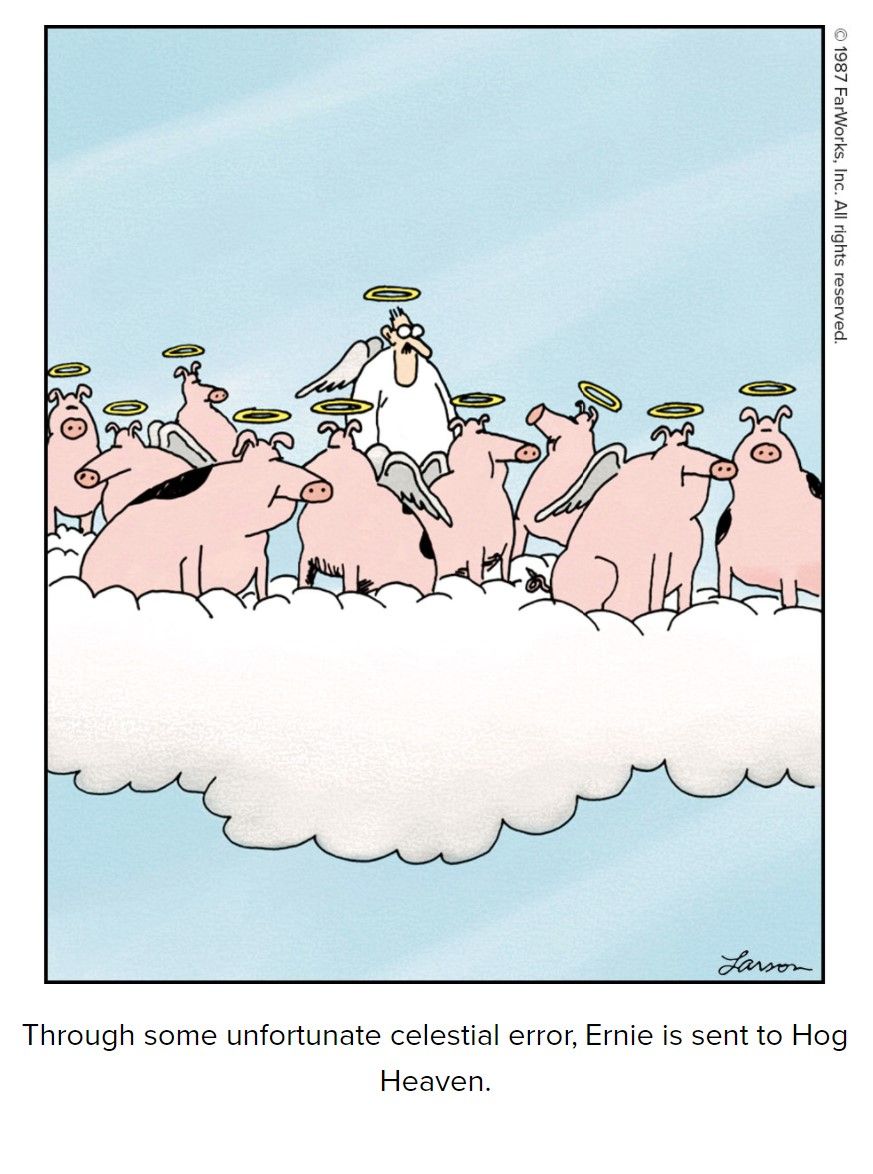
But this time we’re gonna get down and dirty. It’s time for the End of the World, and it’s ugly. Now, the world could just end and drift away in a puff of smoke. Simple, clean, final.


No, not quite. But a lot of things do simply end. Movies end, meals end, and jobs end. Even the Mayan calendar that supposedly went back to 3114 BCE simply ended in 2012, with no fanfare.
A 5000-year farewell and not so much as a single party for 2012? Even the End of the World in 2000 got a party.
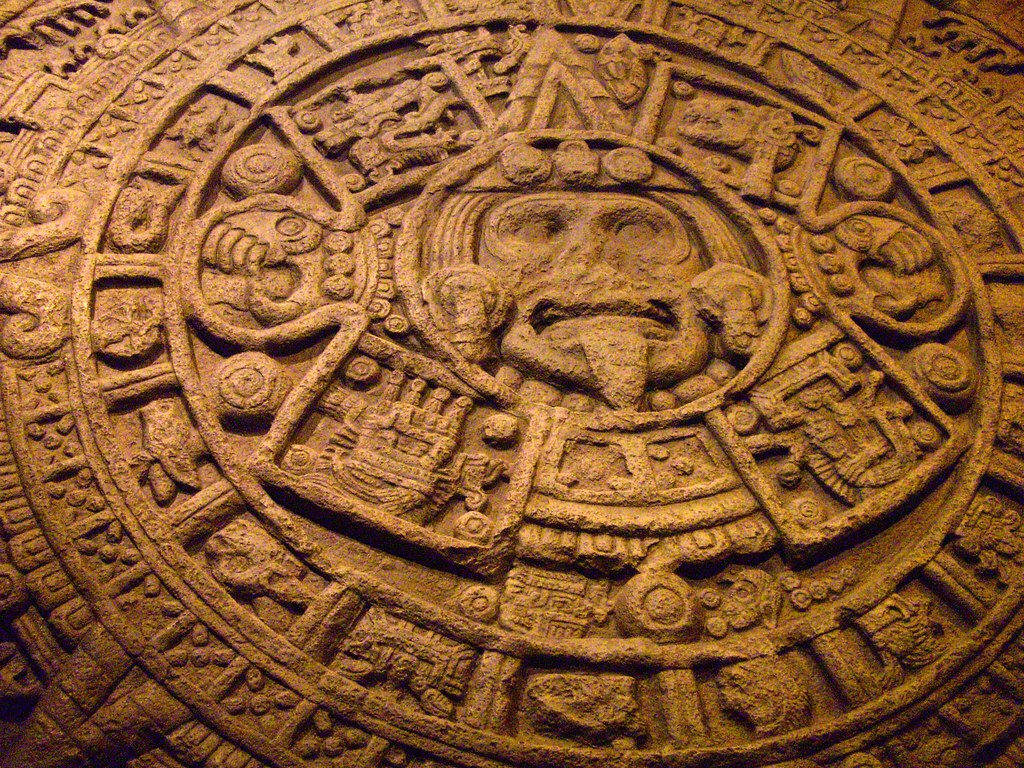

But sometimes a simple end is just too easy. And so when the world ends according to Revelation, it ends with a bang. A lot of bangs. And we’re gonna take a microscope to the carnage in the highest resolution possible. All aboard!

Coming up: 7 Broken Seals, 7 Trumpets, 7 Plagues, and a heavy, heavy dose of vengeance…
Rev 6:16 “…the great day of [God’s] wrath has come, and who can withstand it?”
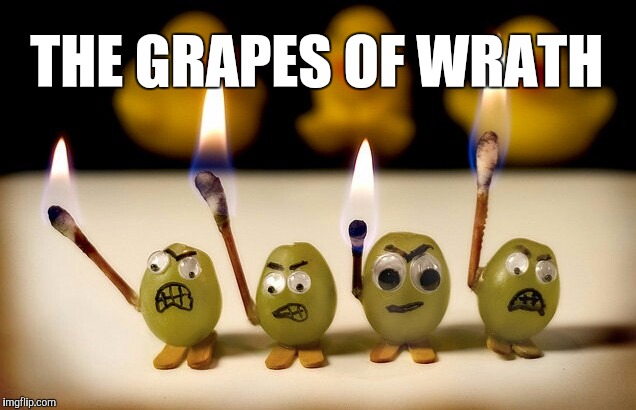
The End, as John sees it, isn’t simply an orderly judgement in God’s court, like in Perry Mason or Matlock.
It includes full-on destruction, chaos, and retribution. And the payback isn’t for wrongs committed to people all over the world by their neighbors, like Chinese Confucianists attacking Tibetan Buddhists, or Pakistani Muslims attacking Indian Hindus. Those guys, and religions, can seek justice on their own.
John’s justice is focused on wrongs committed to him, and to his fellow Jewish believers in Christ.
Rev 6:10 “How long, Sovereign Lord…until you…avenge OUR blood?”
Rev 18:6 “…pay her [Babylon] back double for what she has done.”

To me, that doesn’t sound like John is prophesying 2000 years into the future. That sounds like John is pixxed off right NOW, in his time, at the people around him. And he wants, and expects, some vengeance.
And that leads me to a greater point I’ll be presenting as we get deeper into Revelation. To me, the Jews always seem to write the most when they are under the most stress and pressure. There’s a TON of the Old Testament written about the Assyrian invasion of 722 BCE, and a TON written about the Babylonian invasion of 586 BCE, and four whole Books of the Maccabees (in the Apocrypha) written about fighting Antiochus IV and the Seleucids in 175 BCE. All about other nations picking on Israel.
And in John’s time, the bad guy was the biggest city and the biggest empire in the world, Rome. More than a million people living on top of each other with no electricity, no interstates, no internet, and no centralized municipal sewage system. Whoa.


Roman public, very public, toilets. You can guess what the sponge on a stick is for. I just hope it wasn’t shared.

So I’m gonna present the case that for John, the blessed End of the World which he seems to be expecting, and maybe even looking and hoping for, included, in a big way, the end of Rome. Because for John, Rome was his world.

Today, it’s a little hard to conceive of one world government. A whole world? We can’t even manage uniform laws between 50 states. And if you don’t like America, you can just go live in France, or Canada, or even in a Mongolian yurt if you are really adventurous. Just pick the place you are happiest with, pack up, and go for it.

In America, there’s superhighways…coast-to-coast…easy to get anywhere. And there’s no destination, that’s toooo faaar…
But in John’s day, there was Rome. And to get beyond the reach of the Roman Empire, one had to go one hell of a long way, by foot or by hoof. Patmos is just about where the last ‘a’ is in the word Achaea.
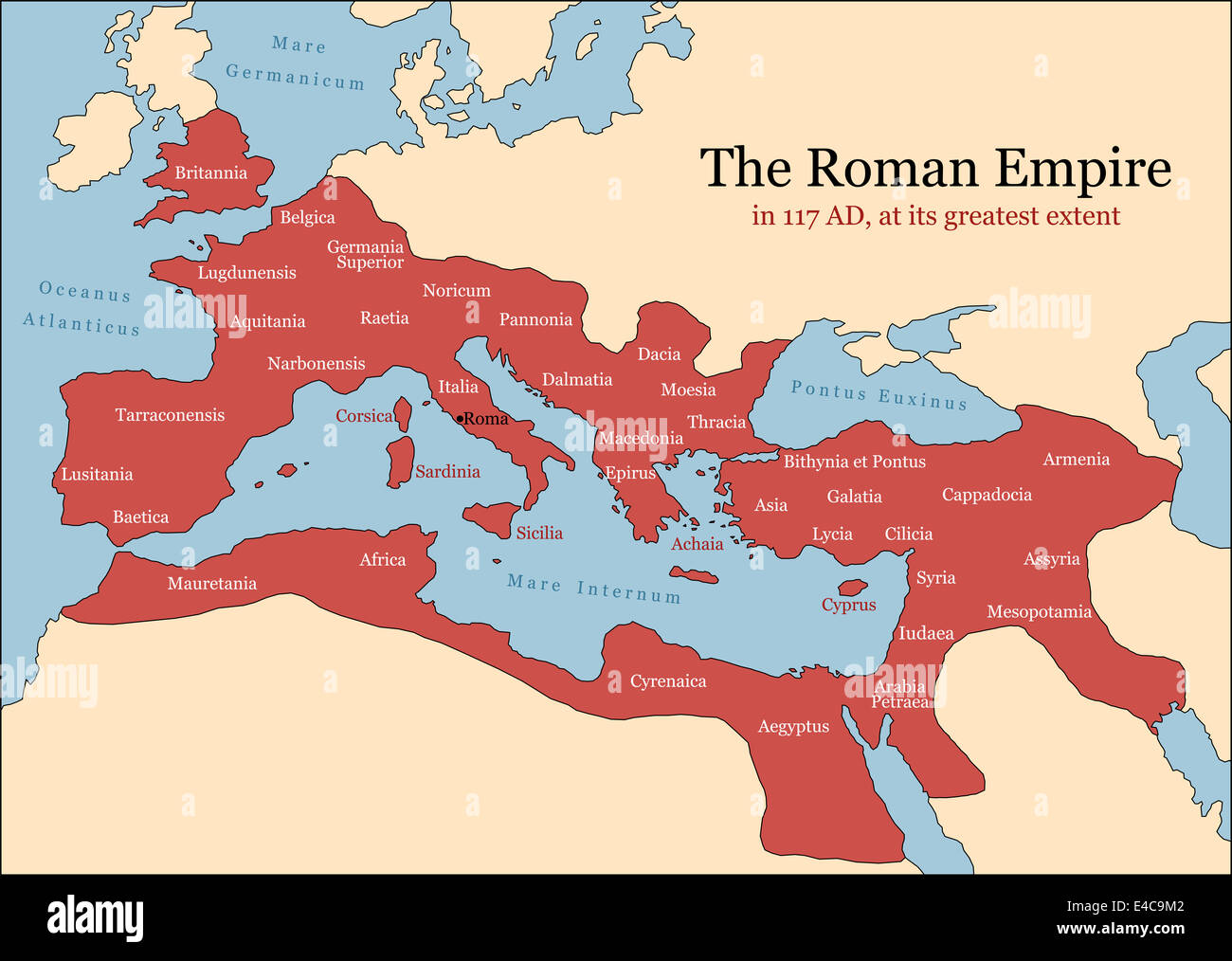
There’s a reason the Romans called the Mediterranean “Mare Nostrum,”, or Our Sea. That’s because it was their backyard, coast to coast to coast.
So to understand John’s life and why he might be so pixxed off, we’re gonna take a deep dive into the Roman Empire and try to get into John’s Jewish mind, circa the late 1st Century AD.
But not just yet. Because Revelation, to me, is much more complex than just that. John’s not just living in his own time. He has a past. And a lot of the things John sees in his vision from God are from John’s Jewish past.

Those 4 strange creatures in God’s court don’t just show up in Revelation out of nowhere.

They go all the way back to Ezekiel, and to Daniel. So what John expects the End of the World to look like is the culmination of over 1000 years of Hebrew history, tradition, visions, and ideas.
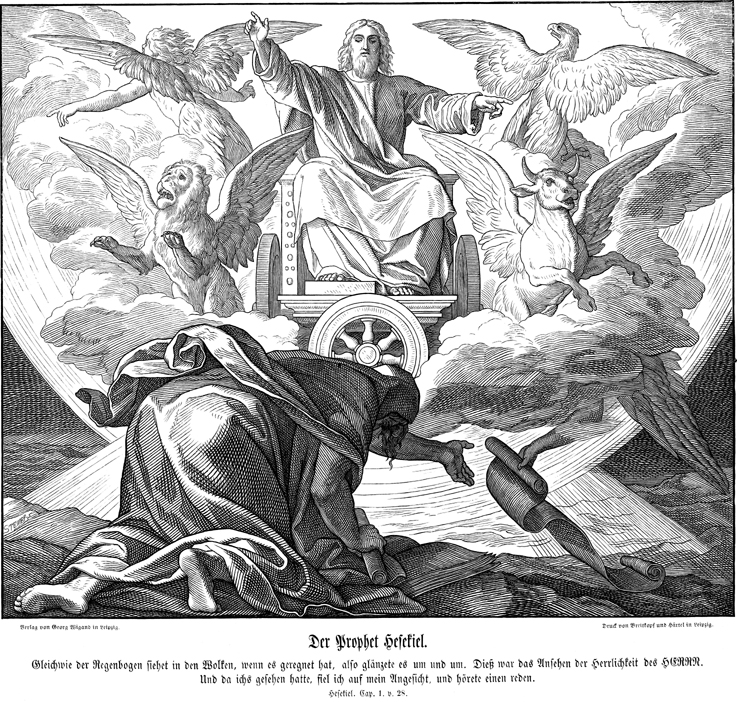
You might remember our cumulative “End of the World Checklist” list from the several posts ago. John certainly did. Look at how many of these line items we’ve already touched on. And I’ll wager that before we are done with Revelation, we’ll hit nearly all of them. John’s vision wasn’t new to 100ish AD, it was in fact very, very old.
Cumulative Old Testament End Times Checklist:
850 BCE Obadiah: 1) Everybody loves Jerusalem and Yahweh
740 BCE Amos: 2) Israel gets a permanent home
700 BCE Micah: 3) The Temple is center of world worship and the Ten Tribes return home
630 BCE Zephaniah: 4) The entire world is destroyed with fire by God, but a remnant remains
600 BCE Isaiah-I: 5) 6-Winged Seraphim, God’s throne, and a protective canopy over Jerusalem
570 BCE Ezekiel: 6) Multi-faced creatures, eating scrolls, marks on the flesh, 25 Elders, and hellish pits
500 BCE Zechariah-I 7) 4 colored horses, lampstands, olive trees, 7-eyed rocks
500 BCE Zechariah-II 8) Jerusalem rises up, plague kills the world, and we all celebrate Jewish Festivals.
430 BCE Malachi: 9) Elijah precedes The End
300 BCE Joel: 10) a Mighty Army and a Trial of Nations precedes The End
So with that preface, lets’ get into some destruction with Revelation Chapter 6 and the 7 Seals!
Here’s five to start with.

The first four seals that Jesus opens reintroduces some other old friends, the Four Horsemen of the Apocalypse.
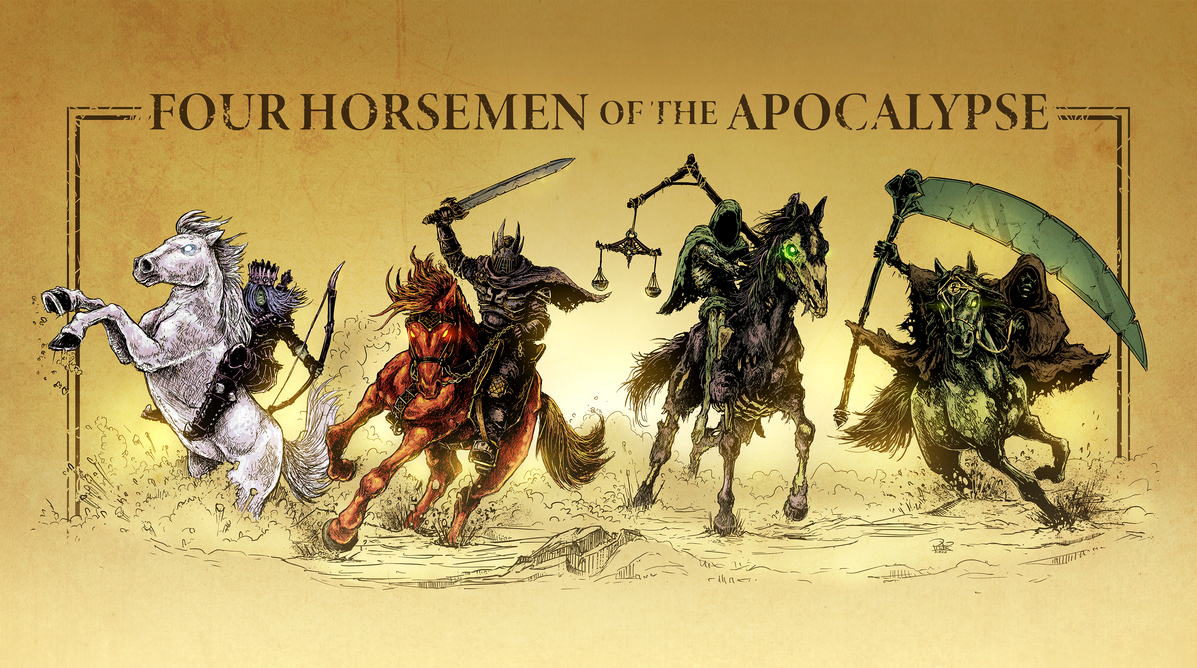
You might remember them from when they first appeared back in Zechariah, 500 years before John was even born.
Zech 6:1 “I looked up again, and there before me were four chariots…The first chariot had red horses, the second black, the third white, and the fourth dappled—all of them powerful.”
Back then, the horsemen weren’t destroying the world, and there’s been a lot of attempts to understand what the horsemen meant in John’s time, as opposed to what they meant in Zechariah’s time. The meanings of both words and symbols do change over time. Being gay in the 1890’s was a bit different than being gay in 2024.

And being a di ck in the 1940’s meant you were a detective.

Context ALWAYS matters in language, both then and now.

But there are some clues as to what the 4 horsemen meant to John.
The white horse is called a “conqueror”, which has a national implication to it. People don’t conquer individuals; nations conquer other nations. The red horse “takes peace.” That’s pretty broad, and it could represent civil strife, or maybe even civil war, since conquering is already accounted for by the white horse. The black horse with his scales implies economic troubles, and we even learn about 1st Century pay schedules…
Rev 6:6 “Two pounds of wheat for a day’s wages, and six pounds of barley for a day’s wages…”
Sounds like somebody was upset with inflation, or maybe minimum wage, even back then. Some things apparently never change.

And the pale horse covers everything else that is bad…plague, disease, etc. We also learn that the pale rider is Death, himself.
Rev 6:8 “Its rider was named Death…”

And we also learn that the pale rider brings a friend along – Hades.
Rev 6:8 “…and Hades was following close behind him”
That’s interesting because Hades is in no way Jewish. Hades is a Greek god, and a Greek place. The god of the Underworld.
Here’s Hades with his 3-headed dog, Cerberus. “Missing an arm? Buddy, you look like Hell! Well, the Underworld, at least.”

In Greek Mythology, Hades (the god of the Underworld), and his two brothers, Zeus (the god of the Sky), and Poseidon (the god of Water) rose up and rebelled against their parents in their version of Heaven. Unlike when Satan rose up against his Dad, Hades, Zeus, and Poseidon actually won their war in Heaven, and went on to rule the world, and the whole universe, for themselves.


So a question is, “What do we make of John referencing Hades?” Or even more pointedly, why is God giving John a vision of another god, Hades?
Hmmm.
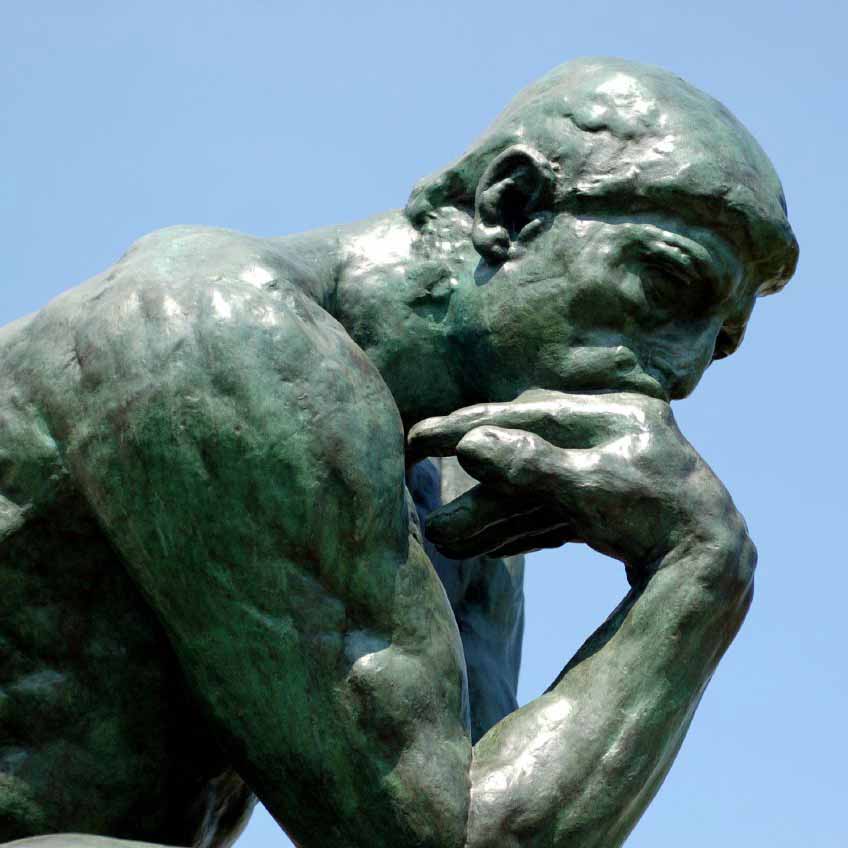
Despite the fact that John is talking about two gods, I don’t consider him to be polytheistic in any way, though some Muslims may. For them, God is God is God. The one, and only. No other gods. No other manifestations. Period. My new favorite verse in the Koran is Chapter 4, verse 141:
“Do not say ‘Trinity.’ Stop!”
I actually laugh sometimes when I read that. That’s as direct an appeal as one can have. Stop! Lol.
But at a minimum, the fact that John talks about Hades, either as an entity, or as a place, or both, shows Greek influence. The Jews do have a concept of an underworld, Sheol, but it’s not a place of punishment, and it doesn’t have a separate god that rules over that underworld. And, you’ll note that the pale horse is not bringing Hades along for a ride in Zechariah’s earlier version. So that’s just a fantastically interesting verse by John.
Oh to have a conversation with 1st Century John to tell us what he actually thought about God, and Hades!

And there are other signs in Revelation showing the awkwardness that occurs when “other” people [Gentiles] adopt “our” [Jews] religion.
Rev 2:9 “I know about the slander of those who say they are Jews and are not…”
“What do I make of a Gentile who says he worships my God, but won’t stop worshipping his other ones on the side?” Or, “How can I be sure when I eat the food at his dinner party he hasn’t already offered it to Zeus before I got there?”
So many difficult situations. “Do these Gentile Greeks really love Yahweh?” How can one be sure what is truly in another person’s heart? Maybe they ARE worshipping other gods in secret?”

Those are just a few interesting points that show how gray and scrambled up the 1st Century was. Which is why I like it so much. Because to me, it shows that John wasn’t exactly a Gentile Christian; he was still very much a Jew, who believed in Christ, as his expected Messiah. That’ll be another thread I weave through future posts.
And the destruction doesn’t stop with those first 4 horsemen. Oh no. We’re just getting started.
So next time it’s gonna be more John, and more destructive seals, and more Rome, and more Judaism, in the Christian Book of Revelation. Till then, more hot chicks.




|
|
|
|
 |
Clemson Icon [26245]
TigerPulse: 100%
54
Posts: 14984
Joined: 2001
|
Re: Religious Pron: The Book of Revelation (7 of ?); Chapter 6A

1
Sep 14, 2024, 10:54 PM
|
|
Fun. Pale riders are the best.
The reference to Hades by name was of course cross cultural. We do it today: "The Freddie Kruger of the world is not to be taken lightly." Doesnt mean Fri 13th was real. But imo the reference to the place/person was not cross cultural. John knew of the war in heaven that precipitated all this, and Jesus spoke of it, and I think John was referring to that.
|
|
|
|
|
 |
Top TigerNet [32223]
TigerPulse: 100%
55
|
Re: Religious Pron: The Book of Revelation (7 of ?); Chapter 6A

2
Sep 15, 2024, 3:30 AM
|
|
Yeah, sadly, it's impossible to get into John's head completely and parse out what he meant by the terms he used. I doubt he meant Hades in the sense that a Greek meant Hades. The term "ship', for instance, is both a specific term, and a general term.
To a maritime nerd, a ship is distinct from a barque or a schooner or a brig or a clipper. Each is a very particular type of watercraft. To the layperson, they are all "ships."
My suspicion is that John probably thought of Hades as just another angel (rather than a god), albeit a bad angel, since most secondary deities are angels in Judaism - including Satan himself.
That's why I said I don't consider him to be polytheistic. That would be completely counter to all of his Jewish history. But it does show the blending at least of terms, between the Greeks and Jews.
They're be plenty of other examples coming up too. Revelation is just an amazing book,, and the deeper I get into it, the more valuable an awareness of John's world and John's circumstances becomes, I think.
|
|
|
|
|
 |
Ultimate Clemson Legend [103204]
TigerPulse: 100%
64
Posts: 99162
Joined: 2009
|
John's revelation is a mystery.

3
Sep 15, 2024, 7:45 AM
|
|
Imo, it's fruitless to try and comprehend what will happen and I believe it also covered what had happened in that prophesies can be specific to two events separated by thousands of years. However, if one wants real prophesies limited to the end of all time many of the NT writers provided them and they are much more plain and simple.
They tell us everything we want to know except the one thing which motivates people to study them. They refuse to give us the day, the month, the year and the hour when Christ will take that second lap.
|
|
|
|
|
 |
Top TigerNet [32223]
TigerPulse: 100%
55
|
Re: John's revelation is a mystery.

1
Sep 15, 2024, 1:36 PM
|
|
>Imo, it's fruitless to try and comprehend what will happen
True, it's impossible to know the future. These were, after all, all visions from prophets, and so one has to 1) trust the message, 2) trust the prophet, 3) trust that the prophet understood the message, and 4) trust that we understand the prophet's translation of the message.
That's a lot of trust. Even if one believes in God, how can one be sure John of Patmos relayed God's message accurately? It takes as much trust in John, a person that none of us has ever met, as it does in God, that we received God's message through John correctly. Unless God speaks to one directly, everything else is a game of "Telephone," to some degree, in my mind.
>prophesies can be specific to two events separated by thousands of years.
I can agree with that. There's no rule of the universe that says a prophecy must be singular, or unique. They might be like the term 'ship.' Both specific and general.
>...except the one thing which motivates people to study them. I enjoy learning and seeing how people think and how they interpret things. So to imagine John, in his world, looking around at his current events, and knowing his past, it's exciting to wonder what he thought. Of course, it's all guess, short of being John himself.
If you remember the old series "In Search Of...", this was the disclaimer for the show...

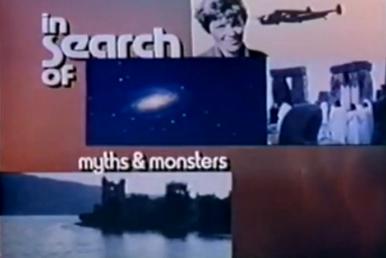
"This series presents information based in part on theory and conjecture. The producer's purpose is to suggest some possible explanations, but not necessarily the only ones, to the mysteries we will examine."
That's the best we can do...some possible explanation. But like Dabo says, "That's where the fun is!"...at least for me.
|
|
|
|
|
 |
Clemson Icon [26245]
TigerPulse: 100%
54
Posts: 14984
Joined: 2001
|
Re: Religious Pron: The Book of Revelation (7 of ?); Chapter 6A

1
Sep 15, 2024, 11:22 AM
[ in reply to Re: Religious Pron: The Book of Revelation (7 of ?); Chapter 6A ] |
|
This is the difficulty of posts. I agree that we might not know why John used a certain term, but if he was a "disciple whom Jesus loved", there are things we can know, such as the idea that if he used a Greek term he was not referring to a Greek myth, but to what he knew about Jesus. You probably agree with that.
|
|
|
|
|
 |
Top TigerNet [32223]
TigerPulse: 100%
55
|
Re: Religious Pron: The Book of Revelation (7 of ?); Chapter 6A

1
Sep 15, 2024, 2:11 PM
|
|
Yeah, I do agree with that.
I don't think that John was referring to the Greek myth in any way. Since he was a Jew, I have no doubt he was as monotheistic as Jews are today. His entire cultural history was trying to curb polytheism...1000 years of Yahweh saying "stop worshipping other gods."
That brings up other points, though. There were other 'semi-divine' beings in the Jewish 'pantheon.' (I'll have to use that word since I can't think of a better one on the spot.)
As I mentioned, angels were/are all over the place...serving as messengers, servants, heavenly heralds, etc. Basically, angels fill the "in between" role between man and god. More than man, but less than God.
And then Jesus, undeniably a man, came along.
So trying to understand how a man can fulfill the role of a God (by giving eternal salvation), must have been a real challenge for early Jews who followed him. Jesus can't be just a man, because he provides salvation...something no other man can do. But Jesus can't be a god, because there's only one God, Yahweh. So what is he? He must somehow be both.
In science, we're right back to the Two-Slit experiment. Light can't be both a particle and a wave, yet somehow, inexplicably, it is. It's both. Our limited understanding of the universe, and limited definitions, don't quite work.
Jumping back to religion, that takes us directly to the concept of the Trinity. Which I'll talk about in a series of future posts. That was among the toughest and longest fights of the early church...to get everyone on that same page.
And that's why I said the Muslims would, and do, consider Christians to be polytheistic to this day. To them, the Father, the Son, and the Holy Spirit constitute three gods, not one God.
As I've read through the Koran, it is an extremely, extremely simple religion. Which might explain why it spread so fast. "One God. That's it. And don't ask any questions. You don't have any hope of understanding him." Lol. Just hope he's merciful.
Back to the Hades term, before I went off on a couple of tangents, it could be translational. I'm not sure if Revelation was written in Greek or Hebrew, but a Greek translator might have said "Oh, John is talking about Hades here." And so he used that word. Could have been anything.
But if we strip through the terms and get down to the concept, John (or God, through John) has brought back the old 4-Horsemen Jewish vision, and added something to it...Death, as a personification.
Because in the older Zechariah vision, Death (as a person, or an entity) was not among the 4 Horsemen. So John sees those horsemen in a new, and more deadly, role, than his ancestors did. And that's a definitive change, based on, I think, what John was experiencing in his own life.
|
|
|
|
|
 |
Clemson Icon [26245]
TigerPulse: 100%
54
Posts: 14984
Joined: 2001
|
Re: Religious Pron: The Book of Revelation (7 of ?); Chapter 6A

1
Sep 16, 2024, 1:19 AM
|
|
Concepts and terminology are often wary bedfellows. We can know a thing, but as soon as we put a word on it we invite disagreement about that word, and with the addition of personal bias and agendas the argument is soon about everything except the original concept. "Trinity" seems to be that.
Propose God exists, fine (if debatable). Say Jesus was him, fine (if debatable). Say the Holy Spirit animates followers, fine. Put all that into "Trinity", you've farted into the mic. It is a word simply to describe a resurrected Jesus discussing the Father and the Spirit in the same paragraph, but it causes a lot of rending of clothes. The individual concepts draw little controversy other than disagreement about the identity of Jesus, a historical matter. But the word Trinity has developed it's own sphere of theological argument.
People look for arguments, imo, because in argument is the opportunity to affirm one's ideology. The term "Trinity" seems to give a lot of people that opportunity. God, Jesus, Spirit, fine. Trinity, "Aha!"
Discussions about it can appear circular:
- Jesus can't be God because there is only one God.
- Yes he can because God is a Trinity.
Either side is circular, Jesus being God or not because one begins with the assumption about God being a trinity or not. Trinity is a word to describe Father, Jesus and Spirit. Jesus resurrected or he didn't. We can't understand God until we see him, and no promises even then.
|
|
|
|
|
 |
Top TigerNet [32223]
TigerPulse: 100%
55
|
Re: Religious Pron: The Book of Revelation (7 of ?); Chapter 6A

1
Sep 16, 2024, 11:35 AM
|
|
>But the word Trinity has developed it's own sphere of theological argument.
Is that ever an understatement, ha ha ha. Wait till we get to Arianism, and Docetism, and Gnosticism, and about 20 more "-isms." All of them trying to reconcile Father, Son, Holy Ghost. And all of them (well, most of them) with quite reasonable scriptural evidence and reasons for their beliefs.
>We can't understand God until we see him, and no promises even then.
Interestingly, that is a very, very, Muslim outlook, too. As I work through the Koran on a separate, parallel track with the Revelation stuff, I'm very surprised at how pragmatic it is in some ways. And not really extremist all. Which just goes to show, if one only listens to extremist rhetoric, one only gets an extremist outlook. Which is much of why they have such a bad rep in the West I think. The fringe element often seems to be the loudest element in anything.
But on pragmatism, while Christianity argued over whether Jesus was 1/3 divine and 2/3 human, or 2/3 divine and 1/3 human, or half and half, for over 300 years, Muslims just said, "Need proof of God? Look out the window. We exist, don't we?"
Where they split with Christianity would be over Jesus and the D&R. So far as I can tell, they bring that same incredibly simple pragmatism to that as well, saying "God's gonna forgive you, or not, at his discretion, regardless of whether Jesus died or not. There is only God." Brutally simple.
But that brutal simplicity is a clear break in theology between the two religions. They also break with Judaism on the Law. Basically, "eat shellfish or don't, eat unleavened bread or not, abide by whatever rules you think might help, but God's gonna do what God wants to do in the end. You have no power, and no say, in the matter, whatsoever."
When one looks at it that way, it's easy to see how the word 'Islam' means 'submit.' When your relationship with God is painted in such stark terms, what else are you going to do, ya know? Infinite being meets mortal man.
|
|
|
|
|
 |
Clemson Icon [26245]
TigerPulse: 100%
54
Posts: 14984
Joined: 2001
|
Re: Religious Pron: The Book of Revelation (7 of ?); Chapter 6A

1
Sep 16, 2024, 1:35 PM
|
|
You are a more winsome proponent of Islam than the imams who manage to get on tv. We can agree that its bad rap in the west comes from its extremist views; the issue is whether the extreme is actually fringe. I do not know where the lines separating 'fringe' from 'minority,' minority from 'deniable strategic tool', and strategy from 'majority' are. However, ISIS, taliban, Iran, wahhabism, never ending terrorist actions, etc, taken together, would seem to have passed well beyond 'fringe'. I don't know where the line is between day and night, but I know when it's midnight. Islamic terrorism is a very well funded a movement, and that money is coming from somewhere.
Sorry, 'fringe' got me going, reminding me of the hostages still in tunnels that required decades, millions of $$, and the complicity of several countries to build.
Like the word "trinity" causes a false debate created by terminology, it seems that debate about the mid-east is somewhat the same way, with the word 'Palestine' being the catalyst. From the Palestinian side, the argument ends with 'from the river to the sea', which is a right to land at the cost of extermination of Jews. This happens because that word has taken on it's own life, with claimed histories assigned to it. If one forgets the names, the history of the region seems much simpler. The descendants of Abraham were there, as an autonomous country, since millennia before the time of Christ, and through Roman rule. From then through the British Mandate the region was never, as I understand it, autonomous. People came and went, some of them converted to Islam in about 1000 AD, and Jews never ceased living there.
To get a debate about Palestine, one first has to assume it exists, creating it from a history that doesn't seem to exist. That, of course, says nothing about fairness, how people should be treated, etc. All that stands on it's own. But you can create a fight only by creating Palestine.
Same with 'trinity', 'Islam' and 'Christianity'. That is the nature of sociological work - we do need terms to work with - and I do understand you search for the sociological explanation for all religious belief. However, if simplicity is good, either Gabriel visited Muhammed or he didn't. Jesus was resurrected or he was not. Atheism will explain the belief in those events sociologically, and clearly those factors are at work. But either neither happened, or one of them. But not both. If one of them did, that is the ultimate simplicity, I would think.
Edit: I watched a video of a Soc class at Penn State. Great prof. During the discussion a student mentioned "Palestine in existence for 3000 years", with murmurs of assent from the class. The prof looked down and sighed, like, "How do we discuss how to think when people have already been told what to think?" He looked up and said, "You can't go back 3000 years, my friend. Islam wasn't around then." The student probably wasn't even embarrassed.
Message was edited by: CUintulsa®
|
|
|
|
|
 |
Top TigerNet [32223]
TigerPulse: 100%
55
|
Re: Religious Pron: The Book of Revelation (7 of ?); Chapter 6A

1
Sep 16, 2024, 5:08 PM
|
|
>the issue is whether the extreme is actually fringe.
That's very true. I'm basing my opinion purely on the written word. And as we know, there is the oral tradition as well, to any religion. So what people are being taught in mosques, vs. via the Koran itself, may well be different.
>ISIS, taliban, Iran
Absolutely.
>and the complicity of several countries to build.
Yep.
>To get a debate about Palestine
Some group ALWAYS wants war over there. Always. Every time there is any peace, the proxies start throwing kindling on the fire. What a mess.
>But not both
This is where I'll differ with you.  "> Given God exists, I'm still working on an understanding of him where he can speak to different people in different ways, and at different times, and with different conditions. "> Given God exists, I'm still working on an understanding of him where he can speak to different people in different ways, and at different times, and with different conditions.
I might have simplified a bit too much on Judaism-Islam. The Muslims don't think the Jews are wrong in the Law, necessarily. They think they are archaic. I believe (and I'm not a Muslim so I wish we had one to fact check me) that the Jews correctly did what God, through Moses, told them to do for several thousand years.
But now, with Islam, they no longer need to do that. Muslims view Islam a bit in the way Christians view Judaism. "Now that Jesus is here, the old rules no longer apply." So it's more of, "Now that Islam is here, the old rules no longer apply."
They have a bit of a different take on Jesus...mainly that he was misunderstood or misrepresented, but the end result is that Muslims think Islam is the "latest version and fully patched" software that God wants us to have.
>The student probably wasn't even embarrassed.
Yeah, it's so complicated in so many ways. Just a mess.
|
|
|
|
|
 |
Clemson Icon [26245]
TigerPulse: 100%
54
Posts: 14984
Joined: 2001
|
Re: Religious Pron: The Book of Revelation (7 of ?); Chapter 6A

1
Sep 16, 2024, 9:45 PM
|
|
Sure, there is a lot there that asks for a reconciliation of the two. I can very much understand someone thinking the two can be equal communications from God.
However, my understanding is that the basic tenets of the two prevent that being the case, attractive as it might be. There are converts from Islam to Jesus who can clearly and forcefully describe the foundational differences. That is a different topic. I'm just saying I personally can't reconcile the two.
I might propose this: If the two can be reconciled, one is left with the resurrection of Jesus (cant reconcile the two by discounting the central tenet). If Jesus was resurrected, Islam would need to be understood in that light, not the other way around. I dont see a way to do that.
But again, that's another subject. I do understand that there are enough similarities to make reconciliation attractive.
Message was edited by: CUintulsa®
|
|
|
|
|
 |
110%er [3701]
TigerPulse: 80%
35
|
Re: Religious Pron: The Book of Revelation (7 of ?); Chapter 6A

1
Sep 16, 2024, 4:25 PM
[ in reply to Re: Religious Pron: The Book of Revelation (7 of ?); Chapter 6A ] |
|
"Where they split with Christianity would be over Jesus and the D&R. So far as I can tell, they bring that same incredibly simple pragmatism to that as well, saying "God's gonna forgive you, or not, at his discretion, regardless of whether Jesus died or not. There is only God." Brutally simple."
Paul seems to agree with them:
Romans 9:18
Therefore God has mercy on whom he wants to have mercy, and he hardens whom he wants to harden.
|
|
|
|
|
 |
Top TigerNet [32223]
TigerPulse: 100%
55
|
Re: Religious Pron: The Book of Revelation (7 of ?); Chapter 6A

1
Sep 16, 2024, 5:21 PM
|
|
It is a very humbling position when one looks at it that way.
That one has as much control over their fate (in the presence of an all-powerful being) as a rudderless boat on raging rapids.
Now, they do say, repeatedly, that God is merciful. They say it over and over and over again (so much so that it almost seems like they nervously posit, "If I say it enough, it becomes true, right?."
But they also sort of say that that's just because who he is, and not because of anything that we do. So they don't have the obedience thing going that Jews do.
And that he might sometimes have a bad day. So, no guarantees.
|
|
|
|
|
 |
110%er [3701]
TigerPulse: 80%
35
|
Re: Religious Pron: The Book of Revelation (7 of ?); Chapter 6A

1
Sep 17, 2024, 10:40 AM
|
|
I think it just shows that these documents were not written to be a handbook from god. Paul was a human with his own biases and agendas. He was a Jew, and he seems to me to put a more Jewish spin on Jesus' message. Jesus was a Jew, but his message was radical. He was a far left liberal nut job in his day. Paul seemed to be more in the middle.
He talked about faith, but he also said make sure you go to church- "do not forsake the assembling of yourselves." Jesus never talked about gathering and worshiping. He said true worship is in spirit and truth. Still a battle that's being fought amongst modern christians...do you have to go to church to be one?
I think we make the mistake this day and age looking back and assuming these people knew what we knew already. Hindsight is 20/20. They didn't have hindsight. They were living what we are reading. They didn't have "scripture". What else was said that wasn't recorded?
When Paul said things, just like a modern preacher, he was addressing something or someone. So when he says "god has mercy on who he has mercy", he was obviously addressing someone who thought they could gain favor with god. To me the thought of finding favor with god is a very modern christian way of thinking. If one goes to church regularly, tithes, doesn't say that bad cuss words, the lord will bless them. That's also a very jewish way of thinking. If I follow the law, go to the synagogue and sacrifice the best that I have, I will find favor with god.
But what is Paul saying here? In one passage he says things like before mentioned- "do not forsake the assembling of yourselves". He talks about the fruit of the spirit in another place, and lists things that will keep you out of heaven...
Here though he seems to say nothing matters. God either shows you mercy or he doesn't. Like you say, it's a very Muslim way of thinking, not a christian or jewish way of thinking, where our actions are all that matters.
|
|
|
|
|
 |
Top TigerNet [32223]
TigerPulse: 100%
55
|
Re: Religious Pron: The Book of Revelation (7 of ?); Chapter 6A
Sep 17, 2024, 2:56 PM
|
|
>I think we make the mistake this day and age looking back and assuming these people knew what we knew already.
This is the biggest challenge in reading any religious document for me, and also the most fun. How does one get into the head, and the time, of the person writing it? What did their words mean in the moment?
Paul is such an interesting guy. He, so far as I know, was the originator of the "faith alone" concept, yet a lot of his letters are devoted to how to live a "good Christian life," ie, acts. I mean, if one banks 100% All in on faith, works, good or bad, shouldn't matter, should they?
Jesus was definitely radical with his "son of God" claim. Surprisingly to me, the "take care of others" message was not so new. One can go to any of a dozen Old Testament prophets and hear the same message...look after widows, and orphans, and the poor, etc. But the Jews had spent 1000 years fighting polytheism and then a guys shows up not saying he worships another god, but that he is the son of the most monotheistic God in history...Yahweh. Yikes, he ruffled some feathers with that one.
I've wondered if he was influenced by the Greeks and their big pantheons. I've never looked into it, but Greeks had been in the area for 300 years, since Alex the Great passed through. So that idea certainly had time to gestate. And all those questions you asked about his nature...the early church went round and round over that for another 300 year. That'll be coming up in some future posts.
|
|
|
|
|
 |
Top TigerNet [32223]
TigerPulse: 100%
55
|
|
|
|
|
 |
Ultimate Clemson Legend [103204]
TigerPulse: 100%
64
Posts: 99162
Joined: 2009
|
Hades literally means place of the dead.

1
Sep 15, 2024, 7:38 AM
|
|
Catholics and other groups call it purgatory a holding place between death and judgement. A fine example of hades was given in the story of Lazarus and the rich man. Without going into the details of the story the most applicable part for this thread is the fact that it was a place of separation. Sons of Abraham, indicating those right with God, were in one section with a vast void between them and those not in God's favor.
That application of Hades is on display in your photo of Clint in Pale Rider, check out the top left corner. So I reckon if even Hollywood knows what it means then...lol.
I love your work!
|
|
|
|
|
 |
Top TigerNet [32223]
TigerPulse: 100%
55
|
Re: Hades literally means place of the dead.
Sep 15, 2024, 3:36 PM
|
|
>Hades literally means place of the dead
It does, but it's also the person who watched over that place, which makes it very confusing. But even if we just consider the place, there's still a lot of questions.
The reason I gave the blurb on Zeus-Poseidon-Hades was to show the subtle differences in thought between Jews and Greeks on the underworld.
If John had said "...and Sheol was behind him." That would have simplified things greatly, but makes it much less interesting, of course. There would still be questions though, like, "Did Death have Sheol in his saddle bags? Or in a little wagon behind the horse? Lol. A symbol can only go so far.
But the important differences are that Jews saw Sheol as a place like purgatory, yes, while the Greeks saw Hades, the place, not so much like purgatory. And the Greeks saw Hades as the realm of a full-on God, while the Jews did not see Sheol that way. For the Jews, all the dead get resurrected from Sheol for Judgement Day, which is not the case for Greek Hades.
But getting into John's head, and what exactly he meant, is very elusive.
>check out the top left corner.
That kind of surprised me. I guess whoever wrote Pale Rider, or at least that poster, knew his Bible very well!
|
|
|
|
|
 |
Ultimate Clemson Legend [103204]
TigerPulse: 100%
64
Posts: 99162
Joined: 2009
|
Re: Hades literally means place of the dead.

1
Sep 16, 2024, 2:11 AM
|
|
That's a magnificent secular view but John didn't address a secular people. If one truly wants to see a writer's intent then he must first consider who he/she is addressing their letters to. Unless a writer is customizing his letters to me it is imperative that I try to assume what the addressee would think about the writings.
This makes the differences in book of Hebrews, by Paul and the letters written by other apostles whose letters were primarily written to Hebrews more harmonious with the letters Paul wrote primarily to gentile converts. Failure to understand that causes confusion between denominations even today.
It's the base argument some have who claim Paul and James took different positions on faith vs works.
|
|
|
|
|
 |
Top TigerNet [32223]
TigerPulse: 100%
55
|
Re: Hades literally means place of the dead.
Sep 16, 2024, 11:57 AM
|
|
That's an excellent point 88.
I've was focusing only on what John 'meant' in his own mind, vs. what John was trying to 'convey' to his audience. And in Turkey, his audience was most likely Greek.
So, while they may not have known about the 4 horsemen in John's own Jewish cultural history, they surely could have understood Hades, as a person or a place or both, from their own cultural history.
It may truly be a case of John "preaching to the crowd" in that sense. Using terminology they were familiar with, and could understand.
|
|
|
|
|
 |
Ultimate Clemson Legend [103204]
TigerPulse: 100%
64
Posts: 99162
Joined: 2009
|
That writing was to the early churches or better yet...

1
Sep 20, 2024, 2:45 PM
|
|
the born again of that day. I'm not saying others wouldn't have had access to the writing but just that gaining insight enough to understand what John was saying the perspective had to be like John.
All our discussions are founded upon our different perspectives.
|
|
|
|
|
 |
Heisman Winner [87288]
TigerPulse: 100%
62
Posts: 39414
Joined: 2003
|
LOL at that Farside, Pigs on the Wing.

1
Sep 16, 2024, 11:48 AM
|
|
HaHa, Charade, you are!
|
|
|
|
|
 |
Top TigerNet [32223]
TigerPulse: 100%
55
|
Re: LOL at that Farside, Pigs on the Wing.

1
Sep 16, 2024, 11:59 AM
|
|
:format(jpeg):mode_rgb():quality(90)/discogs-images/R-14830081-1582411144-2107.jpeg.jpg?)
|
|
|
|
|
 |
110%er [3701]
TigerPulse: 80%
35
|
Re: Religious Pron: The Book of Revelation (7 of ?); Chapter 6A

1
Sep 16, 2024, 2:45 PM
|
|
"To me, the Jews always seem to write the most when they are under the most stress and pressure. "
It seems to be the same today and throughout the history of christianity as well. The NT writers obviously thought the end was near, and walk in any protestant church on a sunday morning and you are likely to hear that god's wrath, because of our sins, is imminent. I mean really that's what religion is. Pressure to live up to a standard and stress about the punishment for not. The Jews thought a loss in a war was punishment for sin. Evangelical Americans believe that the US will be punished for allowing abortion and gay marriage. Oddly nobody ever mentions the atrocious things we did to African and Native Americans. We were a great country back then, up until liberals started taking over according to them. But I'm getting political now so I'll stop...
"In Greek Mythology, Hades (the god of the Underworld), and his two brothers, Zeus (the god of the Sky), and Poseidon (the god of Water) rose up and rebelled against their parents in their version of Heaven. Unlike when Satan rose up against his Dad, Hades, Zeus, and Poseidon actually won their war in Heaven, and went on to rule the world, and the whole universe, for themselves."
That's interesting. Curious if the Satan/Yahweh myth borrowed from this or vice versa?
"The Jews do have a concept of an underworld, Sheol, but it’s not a place of punishment, and it doesn’t have a separate god that rules over that underworld."
Wait wut? The Jews don't believe in Hell? I believe i've seen some discussion on this before but I thought the idea of Hell was in the Old Testament, however not based on faith but observance of the Torah.
|
|
|
|
|
 |
Top TigerNet [32223]
TigerPulse: 100%
55
|
Re: Religious Pron: The Book of Revelation (7 of ?); Chapter 6A
Sep 16, 2024, 5:35 PM
|
|
>Pressure to live up to a standard and stress about the punishment for not.
For the three Abrahamic religions, I'd say so. But the Eastern religions are very different. Much much more about finding understanding than navigating the carrot and stick of heaven and hell.
There's always overlap, of course, but Buddhism and Taoism in particular are really, really different ways of looking at the world, philosophically, at least. I've often said that if I wasn't an Agnostic I could easily be a Taoist. They have a similar outlook.
>That's interesting. Curious if the Satan/Yahweh myth borrowed from this or vice versa?
That's a good question. The idea of Gods having sons (and daughters) seems to be more common in Greek, Meso, and Egyptian religions as well. When Jesus said he was the son of Yahweh, I have to think that met with a lot of resistance with the Jews of his time...being monotheistic and all.
>Wait wut? The Jews don't believe in Hell?
I probably should do a few posts on Hell sometimes. I think a lot of the confusion comes in the definitions. Hell as "separation" from God, vs. Hell as "active punishment allowed by God, via Satan."
All these various concepts and terms change over time and over cultures.
Here's a pretty good washing machine analogy I posted a while back.
Dear Rabbi,
Do Jews believe in Hell? I am not planning any trips there or anything, but I have heard conflicting reports about its existence.
Answer:
We do believe in a type of Hell, but not the one found in cartoons and joke books. Hell is not a punishment in the conventional sense; it is, in fact, the expression of a great kindness.
The Jewish mystics described a spiritual place called “Gehinnom.” This is usually translated as “Hell,” but a better translation would be “the Supernal Washing Machine.” Because that’s exactly how it works. The way our soul is cleansed in Gehinnom is similar to the way our clothes are cleansed in a washing machine.
Put yourself in your socks’ shoes, so to speak. If you were to be thrown into boiling hot water and flung around for half an hour, you might start to feel that someone doesn’t like you. However, the fact is that it is only after going through a wash cycle that the socks can be worn again.
We don’t put our socks in the washing machine to punish them. We put them through what seems like a rough and painful procedure only to make them clean and wearable again. The intense heat of the water loosens the dirt, and the force of being swirled around shakes it off completely. Far from hurting your socks, you are doing them a favor by putting them through this process.
So too with the soul. Every act we do in our lifetime leaves an imprint on our soul. The good we do brightens and elevates our soul, and every wrongdoing leaves a stain that needs to be cleansed. If, at the end of our life, we leave this world without fixing the wrongs we have done, our soul is unable to reach its place of rest on high. We must go through a cycle of deep cleansing. Our soul is flung around at an intense spiritual heat to rid it of any residue it may have gathered, and to prepare it for entry into Heaven.
Of course, this whole process can be avoided. If we truly regret the wrong we have done and make amends with the people we have hurt, we can leave this world with “clean socks.”
That’s why our Sages said, “Repent one day before you die.” And what should you do if you don’t know which day that will be? Repent everyday.
|
|
|
|
|
 |
Top TigerNet [32223]
TigerPulse: 100%
55
|
Re: Religious Pron: The Book of Revelation (7 of ?); Chapter 6A
Sep 16, 2024, 6:02 PM
|
|
That also leads me down a different stream of thought as well.
There was already resurrection in the Bible...a half dozen or so in the OT. So I think the thing that rankled the Jews about Jesus was his claim to be the son of God. Resurrection, they (the Pharisees at least) seemed to be ok with.
For the Gentile Greeks it was the opposite. They had sons of Gods in their own pantheon, so that was no big deal to them. But the idea that a mortal man could be revived from the dead, well, that was too far out there for them to believe.
So that presented two different challenges when trying to convert others.
|
|
|
|
|
 |
110%er [3701]
TigerPulse: 80%
35
|
Re: Religious Pron: The Book of Revelation (7 of ?); Chapter 6A

1
Sep 17, 2024, 10:54 AM
[ in reply to Re: Religious Pron: The Book of Revelation (7 of ?); Chapter 6A ] |
|
"That's a good question. The idea of Gods having sons (and daughters) seems to be more common in Greek, Meso, and Egyptian religions as well. When Jesus said he was the son of Yahweh, I have to think that met with a lot of resistance with the Jews of his time...being monotheistic and all."
Isn't there evidence though that "son of god" was a more generic term at the time? I mean even today christians call themselves a child of god. Did Jesus believe he was special in that regard? That he truly was the one and only son of god? And how did that get turned into "god incarnate"? Was he the offspring of god, or actually god? They were obviously asking that question in the first century, and there wasn't a clear answer.
That's good info on hell. I didn't realize there were such conflicting ideas between the Old Testament and modern christianity. The New Testament seems to be all over the place. Jesus as I understand was referring to a physical place outside Jerusalem when he spoke of hell, but in at least one instance doesn't he allude to someone being trapped there begging for a drop of water? What were Paul's views on hell? Did he even mention it?
|
|
|
|
|
 |
Top TigerNet [32223]
TigerPulse: 100%
55
|
Re: Religious Pron: The Book of Revelation (7 of ?); Chapter 6A

1
Sep 17, 2024, 3:18 PM
|
|
>Isn't there evidence though that "son of god" was a more generic term at the time?
Yes, in some sense. The Hebrews considered themselves "children of god," but I've never gotten the impression that they thought they were divine in any way. I read that more as "protected, or looked after, by God."
>Did Jesus believe he was special in that regard? That he truly was the one and only son of god?
I think he did. Maybe not his entire life, but certainly by his ministry. I say it that way because it brings up an important distinction in your next question.
>And how did that get turned into "god incarnate"?
That's a big one, with a long history. It's the difference between Low Christology, where Jesus was born a man, and either adopted by God, or transformed by God at his baptism or maybe his death, vs. High Christology, where Jesus has existed, with God (or as God) since the beginning of the universe.
When I was practicing I was always taught that Jesus was born purely a man, and he became divine later on...Low Christology. But I think the more prevalent view of modern Christians is High Christology. Both views have evidence for, and against, imo.
>Was he the offspring of god, or actually god?
All that ties into the Trinity, and how to explain Jesus's relationship with God. To a run of the mill monotheistic Jew, how could Jesus be another God? That's polytheism. So the only answer is that they must somehow be the same. The church got ripped apart several times over that issue, with different churches teaching it in different ways.
|
|
|
|
|
 |
Top TigerNet [32223]
TigerPulse: 100%
55
|
Re: Religious Pron: The Book of Revelation (7 of ?); Chapter 6A

1
Sep 17, 2024, 3:37 PM
|
|
>That's good info on hell
Yes, it's changed over time, too. In Jesus's time, I believe the smoldering trash dump outside of Jerusalem was equated with Hell. Whether they thought that actually was Hell, or just 'like' Hell, I'm not sure. For Paul, nothing comes to mind. I'll do some research and put it on my list for a future post.
|
|
|
|
|
 |
110%er [3701]
TigerPulse: 80%
35
|
Re: Religious Pron: The Book of Revelation (7 of ?); Chapter 6A

1
Sep 18, 2024, 11:12 AM
[ in reply to Re: Religious Pron: The Book of Revelation (7 of ?); Chapter 6A ] |
|
Fordtunate Son responding to your post above here as well...
"Paul is such an interesting guy. He, so far as I know, was the originator of the "faith alone" concept, yet a lot of his letters are devoted to how to live a "good Christian life," ie, acts. I mean, if one banks 100% All in on faith, works, good or bad, shouldn't matter, should they?
Jesus was definitely radical with his "son of God" claim. Surprisingly to me, the "take care of others" message was not so new. One can go to any of a dozen Old Testament prophets and hear the same message...look after widows, and orphans, and the poor, etc. But the Jews had spent 1000 years fighting polytheism and then a guys shows up not saying he worships another god, but that he is the son of the most monotheistic God in history...Yahweh. Yikes, he ruffled some feathers with that one."
The thing that makes Paul even more interesting in my mind is that he was writing before the gospels, which seems backwards to most christians I would imagine. I would bet that most don't realize when they read the New Testament, that they are reading the opposite way that they think they are. They think Jesus came and his life was recorded, and them Paul and the other NT writers came along after. I believe one of the last books of the NT, the book of James, is actually believed to be one of the first written. Interestingly he argues for works and faith, which seems to contradict Paul like you say.
"I think he did. Maybe not his entire life, but certainly by his ministry. I say it that way because it brings up an important distinction in your next question."
I should change my question to "Did Jesus believe he was god?". Son of god was thrown around a lot back then even for emporers of Rome. Not hard to imagine this sect of Judaism calling their leader a son of god as well.
Also, doesn't Jesus repeatedly refer to "the father" as a separate person? And is he ever referred to as equal with god anywhere other than the gospel of John, where he says "I and the Father are one"?
"When I was practicing I was always taught that Jesus was born purely a man, and he became divine later on...Low Christology. But I think the more prevalent view of modern Christians is High Christology. Both views have evidence for, and against, imo."
High christology is definetely much more prevalent, and I have to say you were playing with fire teaching a low christology lol. That would have gotten you banned from teaching in the churches I've attended.
If you take the gospels at face value though I would agree with you, there definitely seems to be a growth in Jesus' realization of who he is, and who is followers thought he was. I guess that's why the New Testament was put together the way it was...from a simple biography in Mark to John claiming Jesus was there at the beginning of time.
BTW, none of that lines up with the Jewish view of the Messiah. He wasn't supposed to be god, he wasn't supposed to rise from the dead, he wasn't supposed save the world from their sins...
Considering that, does it even make sense for someone to believe the Old Testament AND the New Testament go hand in hand, and are both the works of an almighty god?
|
|
|
|
|
 |
Top TigerNet [32223]
TigerPulse: 100%
55
|
Re: Religious Pron: The Book of Revelation (7 of ?); Chapter 6A

1
Sep 18, 2024, 12:40 PM
|
|
The Big Dog®
>he was writing before the gospels
Yep. Some of his letters are considered among the earliest of scriptures. I've read that Galatians is the oldest, going back to maybe 50 AD.
>Interestingly he argues for works and faith...
I think it does too, which is not surprising once one knows the history. Even today, works matter in Judaism, and so for Paul to propose that they didn't was as radical as Jesus saying he was the Son of God.
Nearly every early Christian was a Jew looking for an expected Messiah. And so they were simply Jews, who believed in Christ. That didn't change their underlying Judaism and its teachings regarding acts. The split came when Paul began to recruit Gentiles who didn't have that same Jewish background. So his message of "All Faith" was much better received by that audience, I imagine. Paul only spent maybe a week, in a couple of visits, with the Church fathers in Jerusalem. The rest of the time he was on the road. It was James, brother of Jesus, who was preaching to Jews in Jerusalem.
There is even the idea that James Chapter 2 is a direct rebuttal to Paul. Since James was writing to fellow Jews, he wouldn't have to convince them about the traditional Jewish view on acts...they would already know it. So for him to even have Chapter 2 shows he is reacting to something, or someone, who sees acts differently.
James 2:20 "You foolish person, do you want evidence that faith without deeds is useless?"
>"Did Jesus believe he was god?"
I’m not sure that he did, at least not in Trinitarian terms. Aside from John (a late addition to scripture), he repeatedly speaks in terms of Father and Son. There are clues to his view everywhere…”
No one comes to the father but by me.” That shows separation. Even in Revelation, there is a clear distinction between ‘God’ and ‘the Lamb.’ I sort of feel like the Trinity is a mechanism to resolve having 2 (actually 3) divine essences, within a monotheistic religion.
>That would have gotten you banned from teaching in the churches I've attended.
Lol we were practically banned anyhow. Not a lot of love for Holiness folks in my small town.
>BTW, none of that lines up with the Jewish view of the Messiah.
Yep. And most significantly, the Messiah was a ‘nation’ saver, not an ‘individual’ saver, or savior. There had been Messiahs before (Cyrus), and some Jews consider there were later ones as well (Bar Kokhba). But they were always cast in terms of protecting the nation of Israel from foreign attack, not redemption of individuals for their sins.
>Considering that, does it even make sense…
The two religions have certainly grown apart over time. But my favorite period is when they are still linked at the hip. The very idea that one needs to be ‘saved’ is completely Jewish. And, they had a mechanism for that…eternal sacrifice (which also served as a nice daily picnic and block party to hold the community together).
And then Jesus came along. But I’m not even fully convinced he saw himself as the final sacrifice. I think he saw his primary purpose as to warn fellow Jews, and fellow Jews only, that the End was imminent.
There’s the famous “I came to fulfill the law” verse, but that can be read in multiple ways. No married couple would consider “fulfilling” their marital vows to be a one-time deal. Most fulfill their marital vows over and over and over again.
So Jesus might have been saying “I came to give you this important message from my Father, God, and they are going to kill me for it. And that’s the price of my delivering the message. I’m being sacrificed like the Law says, but only for my message.” Then he seemed surprised that God didn’t intervene “Why hast though forsaken me?”
It just seems that if God was going to completely end Judaism by revoking the sacrifice process, he would have been more explicit about it. And he’s never reinforced the message in 2000 years. Jews still practice Judaism to this day. Why not send another son, etc?
It’s far more complex than that once John the Baptist and Paul get tossed in the mix. But what I’m trying to do is figure out what each person meant at the time, as opposed to what we think they mean, today. A tough challenge.
Regarding the OT and NT, I do think it's almost impossible to understand the NT without fully understanding the OT. There's a reason people were asking if John the Baptist was Elijah. Because for 500 plus years, Elijah was seen as a precursor to the End. Without knowing that, the Elijah question becomes meaningless. But to the people of the time, that was an important prophecy that helped them decide if they should believe Jesus or not.
|
|
|
|
|
 |
110%er [3701]
TigerPulse: 80%
35
|
Re: Religious Pron: The Book of Revelation (7 of ?); Chapter 6A

1
Sep 18, 2024, 2:09 PM
|
|
Sure, the New Testament is basically a sequel to the Old, I just don’t think when you dig in you come away with the perfect flow from Genesis to Revelation. Obviously you don’t think that either because you point out these differences and questions regarding the text often.
Learning that the “Bible” is a collection of texts that evolved all the way up until the KJV, which btw was a translation in response to other Christians, and is still evolving today with more manuscript evidence, really made me look at the religion in an entirely different light.
So I guess that’s why nowadays when I sit and listen to a pastor say things like “either you believe the Bible or you don’t” I just kind of chuckle to myself and think which version of the Bible and which particular part?
Jesus didn’t have the KJV. When Paul referred to scripture he was talking about the Old Testament. Did he even believe he was writing scripture to be read for thousands of years? It seems he believed the end was near, and that some of the people he was writing to would still be alive when Jesus returned.
Thessalonians 4:17
then we who are alive and remain shall be caught up together with them in the clouds to meet the Lord in the air. And so shall we ever be with the Lord.
|
|
|
|
|
 |
Top TigerNet [32223]
TigerPulse: 100%
55
|
Re: Religious Pron: The Book of Revelation (7 of ?); Chapter 6A

1
Sep 18, 2024, 3:01 PM
|
|
The Big Dog®
>perfect flow from Genesis to Revelation.
I see a long and winding road. Emphasis on winding.
>“either you believe the Bible or you don’t”
To me, it's a library. A library of the history of Israel with their God (OT), and of Jesus (NT), and of Paul's travels, etc. So that's like asking, "Do you believe in the library?" Well, yeah.
Is there fact in the library? Sure. Is there fiction in the library? Sure. A lot of people believe Jesus existed, including me. Maybe not as many believe Jonah got swallowed by a big fish, or a dragon is going to descend from the sky and eat the earth in the End. The very phrase "Do you believe in the Bible" has a hint of misunderstanding to me. And it of course ignores all the contemporary literature surrounding the Biblical texts when they were written.
Granted, folks don't go to church to learn about religion. They go to learn about parts of Christianity, or whatever specific religion they are comfortable with. A few years back I had a conversation with a workmate who said "I'm searching for God." I said, "Oh really? Me too." So I reeled off a list of a half dozen books on various religions I thought he might find interesting, including some works by CS Lewis. He said "I think I'd only be interested in the Lewis works." And I said "Well, it seems like maybe you've already found him." Lol.
>It seems he believed the end was near...
Very much so. And in the case of John, in Revelation, the more I read it, the more I'm starting to think he thought he was already IN the beginnings of the End of the World, in his own time. Sort of like seeing the world end around him. It's very difficult to date, but every time I re-read it I get a deeper understanding of what he thought, in his own time.
|
|
|
|
|
 |
110%er [3701]
TigerPulse: 80%
35
|
Re: Religious Pron: The Book of Revelation (7 of ?); Chapter 6A

1
Sep 18, 2024, 5:28 PM
|
|
"To me, it's a library."
That's a great way of putting it. Unfortunately a lot of people are raised with a very narrow view, that every event literally happened, and every word is sacred from god, and that the bible tells a perfect linear story from creation to the end of times. I'd be curious to know when exactly that view showed up in history. If I'm not mistaken, several of early christian fathers held a more allegorical view of scripture, however Jesus seemed to take a literal approach to the Old Testament.
Matthew 24:37-39
But as the days of Noah were, so shall also the coming of the Son of man be.
For as in the days that were before the flood they were eating and drinking, marrying and giving in marriage, until the day that Noah entered into the ark,
And knew not until the flood came, and took them all away; so shall also the coming of the Son of man be.
Matthew 12:40
For as Jonas was three days and three nights in the whale's belly; so shall the Son of man be three days and three nights in the heart of the earth.
"Granted, folks don't go to church to learn about religion."
Correct, nor do they go to learn about the bible. The views of a particular church shape their understanding of the bible and how it is taught. Unless one considers indoctrination to be a form of learning.
Speaking of CS Lewis, I believe it was him who said that the person who starts questioning god is probably closer to Him, whoever that may be, than they've ever been. That is a radical way of thinking in the environment I grew up in. You didn't question how Noah got all those animals on the ark, you just believed it.
|
|
|
|
|
|
Replies: 34
| visibility 4158
|
|
|
 to award
the award.
to award
the award.














































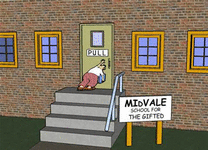
:format(jpeg):mode_rgb():quality(90)/discogs-images/R-14830081-1582411144-2107.jpeg.jpg?)